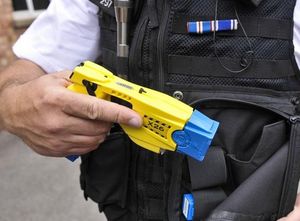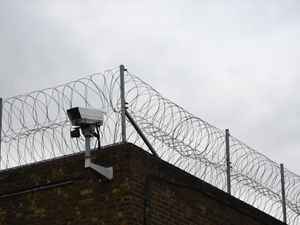Police must address Taser concerns after increase of use on children and mentally ill
The policing watchdog is urging forces to address serious concerns over the use of Tasers or risk losing the trust and confidence of the communities they serve.

The inappropriate use of such weapons featured prominently in the recent court case of West Mercia officer Benjamin Monk, who was convicted of manslaughter for kicking the retired footballer Dalian Atkinson in the head after an "excessive" 33-second Taser deployment in Telford five years ago.
Now the Independent Office for Police Conduct (IOPC) has carried out a review of 101 incidents involving the device resulting in concerns about the increased use of Tasers on children and the mentally ill between 2015 and 2020.
The report said there were several examples of "missed opportunities" for police to diffuse situations before drawing the weapon which works by sending electric pulses through the body, causing temporary incapacitation.
The IOPC also found that black people were more likely to be subjected to prolonged Taser discharge, compared with white people. And the watchdog said there was evidence some officers made derogatory remarks during the incidents.
In May, following investigations lasting five years, Monk was cleared of the ex-Aston Villa player's murder but convicted of his manslaughter after a trial which heard he Tasered him and then kicked him twice in the head as he lay collapsed on the ground. The kicks left two bootlace imprints on the former Premier League star's forehead.

Mr Atkinson, 48, was pronounced dead in hospital shortly after the confrontation outside his childhood home, in Meadow Close, Trench, on August 15, 2016.
It emerged that the former Sheffield Wednesday and Ipswich Town striker had been experiencing mental health issues that night, had a heart condition and was undergoing dialysis treatment.
The report also makes a string of recommendations including improvements to training, guidance and monitoring.
IOPC director general Michael Lockwood said: "We recognise that Tasers are an important tool in policing.
"However, if the concerns identified in our report are not addressed, there is a risk the police will lose the trust and confidence of the communities they serve.
"Ultimately, policing has to change and be more responsive to community concern or risk losing legitimacy in the eyes of the public. These recommendations now sit with policing bodies and forces to act on."
But the Inquest charity which supported Mr Atkinson's family said while the review is welcome, the recommendations do not go far enough to create the systemic change needed.

Deborah Coles, director of the Inquest charity, said: "We don't just need more scrutiny, community oversight, or training or guidance. We need the IOPC, police chiefs and oversight bodies to hold police officers to account when they abuse their powers and to confront the reality presented by this evidence."
Some of the 101 investigations involved six children, the youngest being 14, as well as four people over the age of 60.
The report found mental health concerns or learning disabilities were a factor in 59 of the cases reviewed, and that 14 cases involved Tasers being used in potentially unsafe locations or circumstances, with people sitting on a first-floor window ledge, in a crashed vehicle, and on a moving motorbike.
There was evidence in several of these cases that officers did not attempt to communicate with individuals who had mental health concerns or issues with alcohol or drugs, and instead only shouted instructions.
In response the National Police Chiefs' Council said the report lacks detail and ignores extensive pieces of work that is already well under way to redress problems.
The council's Chief Constable Lucy D'Orsi said: "Focusing on these smaller number of cases missed an opportunity to consider Taser use more broadly, and unfortunately has resulted in recommendations which are mostly out of date and not based on the realities of policing."





